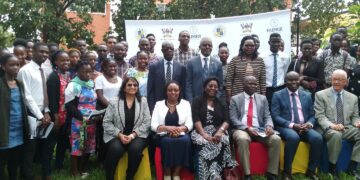Makerere University together with Mbarara University of Science and Technology (MUST), have been picked to host the new Foundation for Advancement of International Medical Education and Research ‘FAIMER’ Regional Institute for health professions educators in East Africa, (EAFRI).
EAFRI will utilize a multilateral partnership model, with Makerere University College of Health Sciences (MakCHS) in Kampala, Uganda, serving as a host institution and Mbarara University of Science and Technology (MUST), Faculty of Medicine in Mbarara, Uganda serving as MakCHS regional partner.
Speaking at the launch held at Makerere University College of Health Sciences in Mulago, Dr Rashmi Vyas, the FAIMER Global Programs Lead, said the multilateral partnership model will expand FAIMER’s reach to promote health professions education and workforce development in additional areas of interest.
She said the institute will enhance and advance the access to health professionals education in the region.
“It will improve the teaching method, leadership, education improvement project, it will advance the field in a way it will enhance the competence of the students they teach, the professionals will be better equipped than others,”
The new institute will serve health professions educators in East Africa including Uganda, Kenya, Somalia, Tanzania, Djibouti, Ethiopia, Eritrea, South Sudan, the Comoros, the Seychelles, and Mauritius.
It will be headed by Prof Sarah Kiguli from Makerere University, who will be deputized by Prof Samuel Maling from MUST.
The Director EAFRI, Professor Sarah Kiguli, said the institute will help build capacity to train teachers, educators in institutions like universities and other training schools which train health professionals like doctors, nurses, dentists, pharmacists, among other health care providers.
She says the trainers will be given skills to design education programs, do work in education research to improve quality of health workers in the region.
Professor Kiguli noted that by doing this it will lead to better quality and improved health of people in the East African region.
“There’s a gap despite many schools training health professionals, however many of the trainers, are not trained teachers or educators, the program will cover that gap but also improve things to see the trainers can do better,” she noted.
She added that in the first cohort, they will admit 12-15 students per year to ensure quality of the products, however the number is subject to increase after fully establishment, noting the first intake will be in August.
Professor Damalie Nakanjako Says the institute to be housed at Makerere, is an opportunity to host the school in Africa. Adding the program has been around for the last 20 years, and has immensely contributed to the health professionals.
FAIMER was established in 2000 as a non-profit foundation of the Educational Commission for Foreign Medical Graduates (ECFMG).
EAFRI joins nine other Regional Institutes, one in Chile, two in China, one in Egypt, four in India, and one in Indonesia.
There are more than 2,000 graduates, known as FAIMER Fellows, of the International FAIMER Institute and FAIMER Regional Institutes, representing nearly 60 countries around the globe.
“With the establishment of EAFRI, we are delighted to provide these faculty development opportunities to educators in the East Africa region.” said Dr. Ronald Blanck, President of FAIMER,
“The shared strength of both MakCHS and MUST will allow EAFRI to advance the health workforce in East Africa, benefiting faculty, students, and the communities in which these healthcare workers serve,” he noted.
“Partnering with FAIMER will enable us to develop leaders in health professions education, research, and community services who will transform the health care system and address the needs of the community in East Africa,” said Dr. Annettee Nakimuli, Dean at the MakCHS School of Medicine.
“Mbarara University’s collaboration with FAIMER provides a monumental opportunity to benefit from globally pooled expertise and resources in order to enhance excellent health professions education and ensure equitable access to health care for everyone,” said Dr. Joseph Ngonzi, Dean for the MUST Faculty of Medicine.









